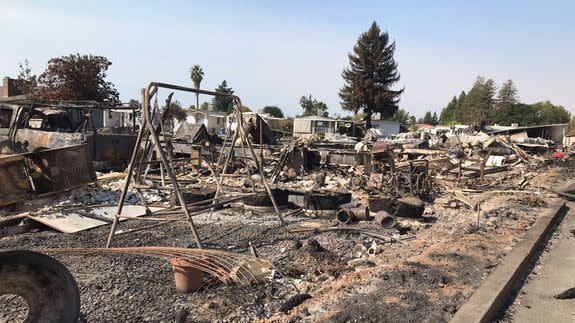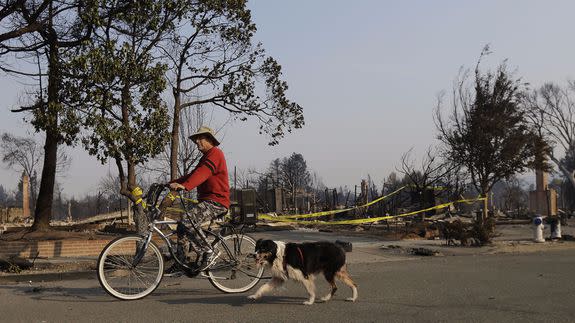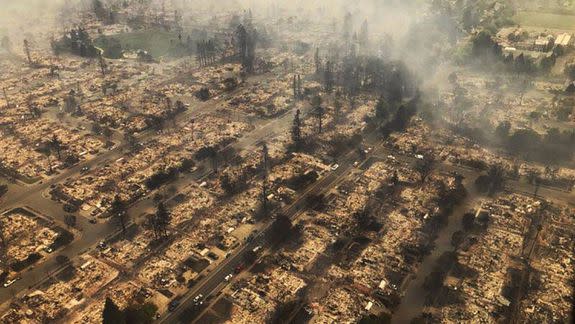'We're just existing': What it was like to survive the deadly Northern California wildfires

Luana Cobb and her son Dan were asleep when a wildfire blew into Coddingtown Mobile Estates in Santa Rosa, California, early Monday morning.
SEE ALSO: How to help survivors of the devastating Northern California wildfires
Luana, 83, awoke to the sound of cars honking and people shouting. She went outside and heard neighbors screaming to get out. Soon, she says, a fireball struck a nearby palm tree. It rained fiery debris onto her shed, which spun embers onto the frame of her house.

Image: rebecca ruiz / mashable
The mobile home was gone within minutes. Luana and Dan, 60, watched from the street in shock as it collapsed onto itself, flames melting and twisting the metal and steel in its path. The fire ripped through more than a dozen mobile homes and tore across the street, setting an ammunition shop ablaze. Luana and Dan were suddenly survivors and evacuees, carrying only what they each had time to grab: medication, checkbook, and wallet for Dan, and an insurance policy and purse for Luana.
"We’re just existing," says Luana, who is sitting at a cafeteria table at the Finley Community Center in Santa Rosa, a city about an hour north of San Francisco. She and Dan have been sleeping at this Red Cross shelter since Monday.
"You’re kind of like in a state of ... what's going to happen next?" she says. "I didn’t think at 83 I would ever end up like this."
The Cobbs are among an estimated 50,000 residents who were mandatorily evacuated or fled their homes since fires in Sonoma and Napa counties began raging Sunday evening. The blazes have killed at least 35 people, burned more than 100,000 acres, and destroyed thousands of homes and businesses. Hundreds are still reported missing. It is one of the worst wildfire disasters in California's history and containing the flames has been painstakingly slow because of difficult weather conditions like low humidity and high winds.
Luana and Dan have contacted their insurance company, but don't know when an adjustor can visit their property. On Thursday afternoon, police officers stood guard near the warped, still-warm remains of Coddingtown Mobile Estates.

Image: rebecca ruiz / mashable
"I know I’m in shock because I wake up in the morning and think, 'Oh gee, I’m going to go do this,'" Luana says. "And I got up this morning and said, 'My god, I don’t have a dish, I don’t have a spoon, a fork, or a knife. I don’t have my comb, and my pills are all there.'"
Many evacuees don't yet know what happened to their homes. As they wait for news, they seek refuge in temporary shelters — and each other.
Here are some of their stories, as told to us on Thursday, which have been lightly edited and condensed:
Ana Maria Villanueva, 69
— Fled with her husband early Monday morning and is waiting to see how her home fares as firefighters try to contain two nearby fires.
I felt somebody at the door knocking and I tell my husband, "There’s somebody at the door." He says, "No, it couldn’t be." I looked through the window and saw the neighbor with a flashlight going to his car, coming inside, going to his car, so I said something is going on.
31 total fatalities confirmed due to 4 fires that started on Sunday. Many remain unaccounted for. Our thoughts are with their loved ones. pic.twitter.com/kPOLSPkPLL
— CAL FIRE PIO (@CALFIRE_PIO) October 13, 2017
I came out and he said, "I was knocking on your door but you didn’t answer." And I said, 'We couldn’t hear what was going on." He said, "There’s a fire, we have to leave." So we left to Safeway, to the parking lot, because they said you have to be in an open space.
After a few days, I am OK, but the impact was so great that I couldn’t believe what was going on. And I thought I was sensing a fire nearby — that’s it. I didn’t have a notion about how big it is. We are OK, but we don’t know what’s going to be happening in a few days.
We are in the hands of the wind. We don’t know what route it will take.
People concentrate on the big news, but the big news is discovering the awareness of friendship, compassion, caring. The volunteers here are awesome. They’re well-organized for disaster. They have all kinds of services, a section for older people, medical assistance ... the doctors check on you, they ask, "Are you OK? What do you need?" There is food 24 hours a day.
I lived in Peru in an earthquake in '66, but it was a real disaster .... it was chaos. Here you feel more secure. The support of friends and family who call you — they give you strength to keep going. The phone is a big help. Being able to be connected is the most important thing. It feeds your spirit.
Colin, 41
— Left his home on Tuesday and doesn't know what happened to it.
I'm, uh, surreal, delirious. Surreal doesn't really cover it. I'm surreal and hedonic. Do you know that term? I'm missing parts of my personality. I'm losing track of them. It's maybe a little extreme, but I'm not sleeping well at all.
[Mine] was a slower [evacuation] process. I got a chance to fill my car. So I had a very luxurious departure compared to some. I've heard a lot of stories about getting out just in time. I was sitting next to a guy in breakfast today and I asked how he was and he told me. He's having a hard time holding it together with his house standing and all his neighbors' [houses] not. I believe the person that woke him up lost their house and saved his life.

Image: AP/REX/Shutterstock
Whole thing is so amazing ... how it's just hard for us to see the sense in it. You always want to look for some reason, but ... we put our houses there. They were explaining the fire as, the way it came over the range, the Mayacamas Range, which creates our wine region here — the experts were explaining the way the fire moved over that range in the analogy of a dam overflowing.
Once it tasted a little fresh oxygen coming off of our coast, it literally pulled it through all the ravines and all the canyons. And it pulled it down into the Santa Rosa Plain. And it was behaving like liquid, a lot of the eyewitnesses were saying. It was just getting shot down there. And they'd never seen anything like it. So it's really frightening. It puts a haunted kind of feeling into an area [where] I used to feel very comfortable and very at peace. It feels like there is an evil kind of there now.
I did watch Annadel State Park burn, and that was very traumatic because I spent my childhood [there] and up till now hiking that park along with all the others. These used to be kind of sanctuaries for me, the outdoors, you know.
And then of course the neighborhoods that resemble people's livelihoods and people's everything are turned to dirt. And anyways it just gets you in touch with spirituality — in a very very hard, serious testing way and it brings you down to earth.
I think what we've witnessed here in this community is exactly how vulnerable we are.
Isaiah Wisdom, 48
— Returned to his intact home Friday after being under an evacuation order.
We knew something was going on. The wind chimes were blowing so hard I had to go take them down. And when I took them down, it was about 1 [a.m.]. There was so much smoke. I looked it up and it said there’s a fire in Calistoga. That’s 20 miles from here. Within an hour we were just getting nervous, and then we get the alerts on the phones that we had to evacuate.

Image: AP/REX/Shutterstock
It wasn’t until the evacuation came in and my neighbor knocked on the door and I looked over and you could see the flames and smoke. I’ve had a lot friends and students who lost their houses. One couple ... they didn’t even have time to drive out. They just went out on foot. They lost everything. We stopped trying to keep track of who lost their homes. We just want to make sure everyone’s safe.
There’s open fields all around here so it just takes the wrong gust of wind. Everything is smoldering still. When I went home today to check on the neighbor’s cats and feed them, check on the house and the freezer, the wind was picking up and I was waving my fist in the air, [saying,] "No, don’t do this!" Let’s go the other direction, away from town.
I came here as a volunteer. I can’t go home, I can’t go to work. There’s nothing for me to do, so I just decided, OK, I’ll come here. This morning one of the first things we heard on the radio was it would be nice if musicians showed up at evacuation centers. I like this style of music. It’s uplifting, it’s fun to play, it’s fast. It can be exciting.
I think when we have disasters like this people remember their true selves, which is that human beings are actually pretty good. My friends have a creamery. The fire was coming over and the call comes out, "Hey, we need to move sheep." So I showed up there. We moved 80 head on Tuesday and we moved the rest of the rams the next day. So everyone comes together in our farming communities. And just if somebody needs something — like the radio today. I can’t go to work. I can’t go to class. There’s too much smoke. There’s no power. The schools are closed. But hey, it would be nice to have some music. I can do that, that’s easy.
Batel, 19, and Lorenzo, 21
— A couple who left their home early Monday morning and are still waiting to hear what happened.
Batel: [Officials] don't let us back there to see anything. I didn't feel good about it. He [Lorenzo] swears the fire just missed everything around the house. It's gone to me. I've really been trying to get around that. The only thing you could do is keep a good mindset and feed off the community. They've been helping out a lot.
The fire was like right next to us, so we absolutely had to evacuate. At least we felt like we had to absolutely evacuate. It was three o'clock in the morning when we were alerted. Most of the urgency came from our neighbors, because actually our news portal didn't prepare us for this at all. We didn't know. The black student union at my school spread the news to me and helped me get a clue about what was happening. Other than that, what got me out of the house at all was my neighbors at three o'clock in the morning knocking on my door, saying, "You gotta get outta here."
Lorenzo: You can do what you can do. There's nothing really more you can do but keep moving forward. It's just another day that you have to endure. Rather than being negative, which is only going to stress you out — it's not going to help the situation — just try to be positive. We've done some things over here trying to help other people. Do whatever we can.
When you come inside [the shelter] you can help as a volunteer. I actually helped a lady bring clothes — she got a bunch of clothes [from Salvation Army] — and I walked with her to her car with a bag of stuff and she was just telling me about her experience and herself. She actually lost her home. It was early in the morning. She had two pit bulls that were not necessarily people-friendly and she had to take them to the car and go, because she woke up and she opened the blinds and the fire was everywhere.
Batel: Me and my mom, when we came down the hill from my house, we literally watched the fire engulf the whole side of Piner [Road]. And you know that it just blew up right in front of us. We were going around trying to get our loved ones ... and like I said, the black student union really came through. A lot of people were communicating — texting, Facebooking, Snapchatting. We were all finding shelters for each other. So from here I think ... what we're really going to try to do is stick together as a community and really help out.
If you are coping with the effects of a natural disaster, you can get help and resources from the Call the Disaster Distress Helpline at 1-800-985-5990 or by texting the number 66746. Spanish speakers can call 1-800-985-5990 and press "2" or text "hablanos" to 66746. If you want to help, find resources here.
WATCH: A police officer recorded this dash footage as he drove through the California wildfire


